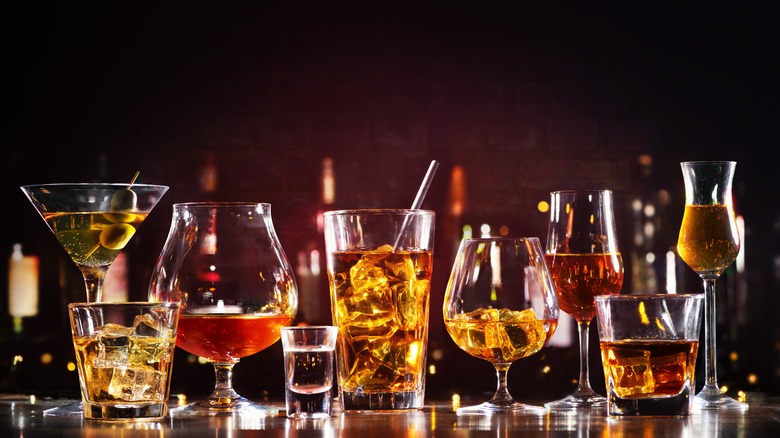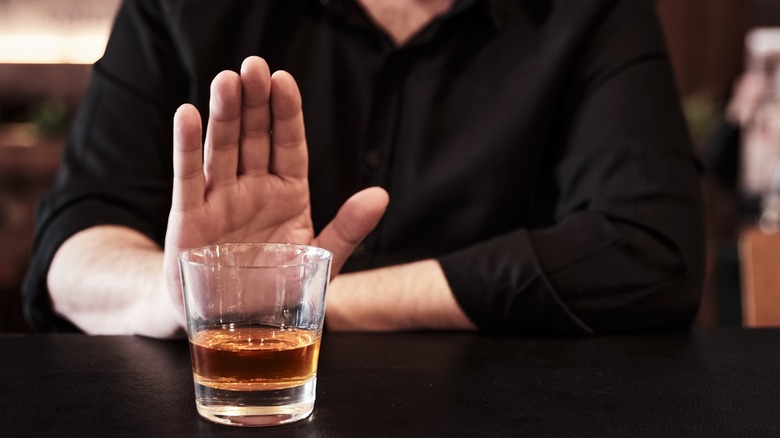Why You Should Avoid Drinking Alcohol When Taking Lupus Medication
Knowing what to eat or drink can be difficult when you have lupus. Some foods and beverages may trigger flare-ups or interact with your meds, while others have the opposite effect, rheumatologist Dr. Diane Kamen told Time. She recommends a diet rich in fruits, vegetables, whole grains, and plant-based protein, along with regular exercise and proper sleep. At the same time, it's important to eat foods that fight inflammation and support gut health.
Things are a little bit more complicated when it comes to lupus and alcohol consumption. For starters, alcoholic beverages promote inflammation and may cause flare-ups in people with autoimmune diseases, according to a recent review published in the journal Gut Microbes. However, its effects are dose-dependent. When consumed in low-to-moderate doses, alcohol may benefit those with type 1 diabetes, lupus, multiple sclerosis, and rheumatoid arthritis. What's more, evidence indicates that drinking small amounts of alcohol (e.g., a half glass of wine daily) may help prevent lupus. In a 2017 large-scale study published in Arthritis Care & Research, women who consumed at least two servings of wine per week were less likely to develop the disease than non-drinkers.
Scientists believe that ethanol and certain antioxidants in alcohol may reduce inflammation, according to the above study. For example, resveratrol — an antioxidant in wine — suppresses pro-inflammatory cytokines, such as interleukin-6 and interleukin-8, which may protect against autoimmune disorders. Even so, you should still think twice before drinking a glass of wine, especially if you're under treatment for lupus.
Alcohol can interact with lupus medications
Lupus is an autoimmune disease and cannot be cured, but certain drugs may ease its symptoms. Doctors usually prescribe corticosteroids, antimalarial drugs, immunosuppressants, or biologics, explains the Cleveland Clinic. You may also need to take ibuprofen and other nonsteroidal anti-inflammatory drugs (NSAIDs) during flare-ups. Some of these medications can interact with alcohol, causing adverse effects. NSAIDs, for example, are harsh on the stomach and can irritate the gut. If you take these meds and drink alcohol, you may end up feeling worse, according to Cincinnati Children's.
Methotrexate and other drugs are metabolized in the liver, and mixing them with alcohol can increase the risk of cirrhosis, or end-stage liver disease, warns the Lupus Foundation of America. Additionally, certain medications, such as anticoagulants, may become less effective when combined with alcohol. In some cases, drug-alcohol interactions can lead to internal bleeding or even death. "When people with lupus drink, the most important considerations are alcohol-medication interactions, effects on the liver, and increased risk of GI (gastrointestinal tract) bleeding," explains rheumatologist Dr. Karen H. Costenbader (via the Lupus Foundation of America).
Also, note that certain drugs prescribed for lupus may cause dizziness. A good example is hydroxychloroquine, an antimalarial drug with anti-inflammatory effects. This medication doesn't directly interact with alcohol, but drinking can make you dizzier and affect your ability to work, drive, or exercise, says WebMD. Given these risks, it's best to avoid alcohol and stick to mocktails, smoothies, fruit juices, or plain water.


